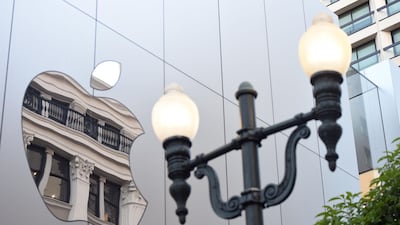Apple shares officially entered correction territory over the weekend after the company reported what has been interpreted as disappointing first-quarter results last week.
But are the results really that bad, or is the market – including many analysts and commentators – misinterpreting them?
There are several reasons to believe that may be the case and that the pessimism over Apple's future is more gloomy than it should be.
Fuelling the cynicism are iPhone unit sales of 77.3 million, which were 1 per cent lower than the 78.3 million in the same quarter a year earlier. That defied many forecasts, since the new iPhone X was a redesign of the iconic device that was expected to kick off a buying “super cycle”.
Apple added to concerns by saying it expects second-quarter revenue of $60 billion to $62bn when it reports again in March, below Bloomberg’s average analyst estimate of $66bn.
The icing on the proverbial cake came from a report from the portal BusinessKorea on Friday suggesting the company will significantly cut iPhone X production in the first half of this year, potentially followed by a complete discontinuation in the second half.
Investors are clearly worried the company’s great cash cow is starting to run out of milk, which is why they sent shares falling 4 per cent on Friday. All told, shares are down more than 10 per cent from a recent high set last month – that’s correction territory.
A closer look at the quarterly results, however, suggests the reaction may be overblown.
For one thing, the iPhone’s average selling price has rocketed. The iPhone X, which sells for $1,000-plus, helped push the product line to an average unit price of $796, a hefty jump from $694 a year earlier.
Not surprisingly, Apple made more money in the quarter overall from iPhones – $61.5bn in revenue rather than $54.3bn, an 11 per cent increase.
More to the point, the company actually sold more phones in a shorter amount of time. While the less expensive iPhone 8, released in September, had a comparable sales window to the preceding iPhone 7, the costlier iPhone X didn’t arrive till November.
On top of that, Apple’s fiscal first quarter had only 13 weeks in it, versus 14 last year. Put it all together and the numbers look a bit better.
Apple sold about 850,000 iPhones per day this past quarter, versus 799,000 a year earlier, according to Andreessen Horowitz partner and company watcher Benedict Evans. That’s not too shabby – and proof that iPhones sales aren’t falling off a cliff any time soon.
_______________
Read more:
Will Facebook's crowdsourced news rating move backfire?
In the battle of AI voice assistants, Google is drowning Siri
_______________
But phones may be besides the point. As Mr Evans notes, the smartphone war is over, the market is plateauing and the players are moving on. Which is exactly what Apple is doing.
Investors may not be giving enough weight to the biggest positive in the company’s results – the heady growth in its services business. The segment, which includes the App Store, Apple Music and Apple Pay, among others, saw 18 per cent growth to $8.4bn.
That may not have matched analysts’ expectations of $8.6bn, but the result is impressive nonetheless. At almost 10 per cent of total revenue, it’s nearly double what it was just three years ago. It’s also more than combined quarterly revenue figures for Netflix and Spotify.
Apple has been growing its services business quickly and headwinds are continuing to build. The company says it now has an install base of 1.3 billion devices on which to sell its various services, up a whopping 30 per cent from just two years ago.
The App Store continues to power ahead as a result. Apple raked in an estimated $11bn from apps over all of 2017, double its take in 2014.
A report in The Wall Street Journal at the weekend, meanwhile, suggested Apple Music subscriptions in the United States are growing by 5 per cent a month. At that rate, the service will surpass market leader Spotify by the summer.
Apple Pay head Jennifer Bailey also told a retail conference in New York last month that more than half of US stores now support the mobile payment service, versus just 3 per cent when it launched in 2014.
Apple earns a reported 15 cents on every $100 spent via what Ms Bailey called “the world’s most accepted contactless payment technology”.
If the current trajectory continues, Apple Pay will eventually start delivering material results, which is a microcosm for the company’s entire services business. It’s progressing more than nicely and Apple may not be getting enough credit for it.
In some ways, it’s the company’s fault. By shepherding through a stream of blockbuster devices, late legendary co-founder Steve Jobs set the expectation of Apple being a purveyor of beautifully designed hardware. But since Tim Cook took over, the company has done much to show it is capable of more.
It’s true that Apple is behind rivals in voice control and artificial intelligence, but it is transitioning nicely from hardware to services otherwise. Company watchers still waiting for the next big thing, or even a blockbuster new iPhone, may just be missing that.
Peter Nowak is a veteran technology writer and the author of Humans 3.0: The Upgrading of the Species

